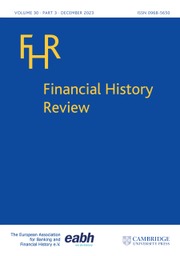Credit for Africans; the demand for a ‘national bank’ in the Gold Coast colony
Published online by Cambridge University Press: 29 August 2003
Abstract
This article traces the origins of the ‘national bank’ in the Gold Coast. It shows how the Colonial authorities perverted the demand by Africans for a special kind of bank to aid their development. The Colonial Office preferred and ensured the establishment of an orthodox institution, which had little to give with regard to Africans' demand for developmental credit. This was because it believed that such development institutions would be unhelpful to, arguably, uncreditworthy Africans. This attitude, it is argued, represented a setback to the Gold Coast's development. Either such an institution, as demanded by Africans, would have helped the colony's advance, or Africans would have learnt earlier that the concept of development was more fundamental than setting up a ‘national bank’.
Cet article retrace les origines de la ‘banque nationale’ de la Côte-de-l'Or. Il démontre que les autorités coloniales dénaturèrent la demande formulée par les Africains d'un type particulier de banque d'aide au développement. Le ministère des colonies préféra, et mit sur pied, une institution orthodoxe qui n'avait pas grand-chose à offrir en matière de crédit au développement, convaincu qu'il était que des institutions de ce type ne seraient guère utiles à des Africains ne jouissant, à leurs yeux, d'aucun crédit. Cet article considère que cette attitude portant préjudice au développement de la Côte-de-l'Or. En effet, ou bien une institution d'aide au développement telle que la souhaitaient les Africains aurait soutenu les progrès de la colonie; ou bien les Africains auraient appris plus rapidement que le concept de développement a des implications plus fondamentales que la mise en place d'une ‘banque nationale’.
Dieser Aufsatz spürt den Ursprüngen der ‘Nationalbank’ an der Goldküste nach. Es zeigt, wie die Kolonialregierung den Bedarf der Afrikaner nach einer spezifischen Entwicklungshilfebank manipulierte. Das Kolonialamt bevorzugte und sicherte eine althergebrachte Institution, die wenig mit dem afrikanischen Bedarf nach Entwicklungskredit zu tun hatte. Es wurde argumentiert, daß Entwicklungsbanken für die, so wurde gesagt, nicht kreditwürdigen Afrikaner wenig hilfreich seien. Der Autor argumentiert, daß diese Einstellung einen Rückschritt in bezug auf die Entwicklung der Goldküste darstellte. Entweder hätte eine solche Institution, wie von den Afrikanern gefordert, geholfen die Kolonie voranzubringen, oder die Afrikaner hätten gelernt, daß Entwicklungshilfe mehr als nur die Gründung einer ‘Nationalbank’ bedeutet.
Este artículo traza los orígenes del ‘banco nacional’ en la Costa de Oro. Muestra como las autoridades coloniales instrumentalizaron la demanda de los africanos por una clase especial de banco para ayudar a su desarrollo. La Oficina Colonial prefirió y aseguró el establecimiento de una institución ortodoxa, que tenía poco que ver con la demanda de los africanos de crédito para el desarrollo. La causa fue la percepción, discutible, de que tales instituciones para el desarrollo no serían útiles para los poco fiables africanos. Esta actitud, se argumenta, representó un revés para el desarrollo de la Costa de Oro. O bien tal institución, como demandaban los africanos, hubiera ayudado al desarrollo de la colonia o bien los africanos hubieran aprendido antes que el concepto de desarrollo era más importante que el establecer un ‘banco nacional’.
- Type
- Research Article
- Information
- Copyright
- © 2003 Cambridge University Press
Footnotes
- 2
- Cited by




